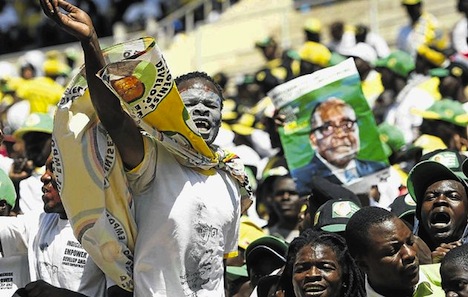We didn’t know results of Zimbabwe’s Wednesday national elections, but it was clear from the first unofficial reports that it was going to be a huge victory for Robert Mugabe and the ZANU-PF (Zimbabwe African National Union – Patriotic Front), as every ‘election’ has been in the 33 years since Zimbabwe won majority rule and independence from the United Kingdom. ![]()
That’s exactly what the Zimbabwe Election Commission has reported over the weekend: Mugabe has defeated Morgan Tsvangirai, the country’s prime minister and leader of the opposition MDC-T (Movement for Democratic Change) by a margin of 61% to 34%, with Welshman Ncube in third place with 2.7%. In addition, the ZANU-PF has won 159 seats in the 210-member House of Assembly, the lower house of Zimbabwe’s parliament, to just 51 for the MDC-T. That’s a loss of 49 seats for the MDC-T over the last parliament, and a gain of 59 for the ZANU-PF, giving Mugabe’s party the two-thirds majority it needs to amend Zimbabwe’s newly adopted constitution.
Tsvangirai and the MDC-T have rejected the results as a ‘huge farce’ amid plenty of reason to doubt the election’s fairness, but there are also reasons to believe that Tsvangirai made key strategic blunders that will leave him on the sidelines of Zimbabwean policymaking as the country turns to the question of who might ultimately succeed Mugabe. It is that ‘election’ — an election with an incredibly small coterie of voters — that will ultimately matter more to Zimbabwe, no matter how rigged Wednesday’s vote. Continue reading Post-election, what comes next for Zimbabwe?
